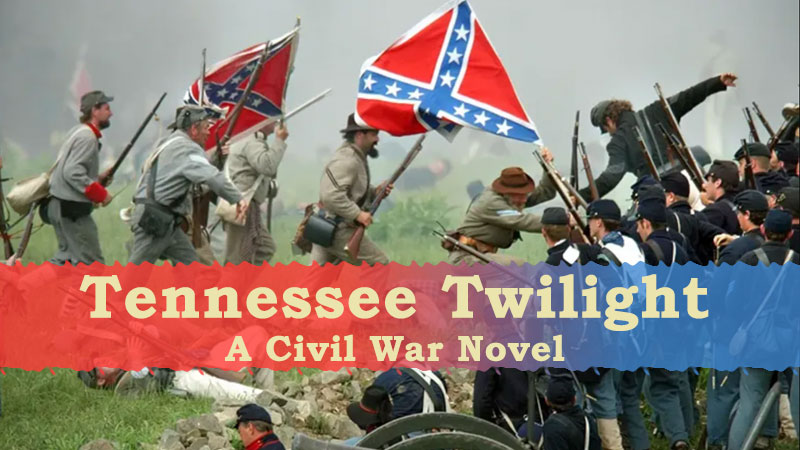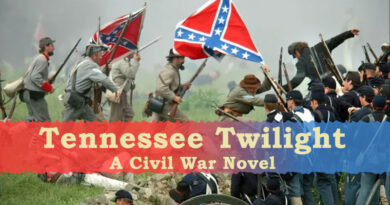Tennessee Twilight: A Civil War Novel – Free Online Novel – Webnovel
This is a work of fiction. The main characters and the incidents in their lives are fictional. The setting, historical personages, and events in the Civil War are real.

Chapter 19 << – Index
Epilogue
Summer 1865
The war will never leave those of us who survived it. And we will never forget those who did not. It has forever altered our lives, but I find something to be thankful for every day. I try not to dwell on what I have lost, but to focus on what I have left:
Barbé and Juba: Juba understands that the connection between Barbé and me can never be broken, but he is no longer tortured by it. When I learned that he had paid the overdue taxes and saved Bluesmoke from the auctioneer’s gavel, I opened the last jar of apple slices the commune had canned and baked a pie. We celebrated everything that night: home, family, and friends. Juba has built a new home down the creek from Bluesmoke, near Charles’s mill. He’s going to build a blacksmith shop there, as well. I am deeding over about fifty acres there to Juba and Barbé. I will give it to them as a Christmas present.
Widow: She is my constant companion. She shadows my every step from the time she awakens me in the morning until she tucks me safely into bed at night. I tell her that my strength is coming back. Her answer to that is, “I’m not taking any chances.” I can’t account for her devotion. She says that taking care of me has given her a new purpose in life. I think she’s trying to compensate for my losses, and to make me feel safe again. She is doing quite a nice job at both.
Josie: He truly is my son, and continues to amaze me every day. I am still in awe of his goodness, his intelligence, and of the gift God gave me by making sure we ended up together. “We will share this little boy,” I told Barbé. “And he’ll grow up to be so spoiled no one will be able to stand him but us.” We laughed heartily. Occasionally, I send him down the creek to spend the night with Barbé and Juba. I watch him until he reaches their house; he turns to wave at me at least a dozen times along the way. I miss him when he’s gone, but I feel no jealousy. I feel good knowing that they love him as their own, and that they will teach him of his African heritage. On the days when I miss Luke most, I stay even closer to Josie. When I tell him I love him, he says, “I love you more.” I’m thankful that Luke and I shared those few precious hours before he was taken from me. When I close my eyes, they flash through my mind like pictures in a book.
Ben: He is slowly becoming the man I met in Knoxville, if not externally, certainly internally. I sometimes wish I’d never seen Knoxville, wish I could wipe the experiences I had there from my mind and the shame from my heart. But if I hadn’t made that trip, I would have never met Josie or Ben. With Crocker’s help, Ben has fashioned a tree limb into a leg, which he lashes to his thigh with a band of leather. It’s crude, but it will do until we can get a better one.
Crocker: The Crocker of old is no more, and I’m learning to know the new one. He still runs the mill, and he has spent untold hours working on Barbé and Juba’s new house. Occasionally, Juba pushes a few coins in the pocket of his overalls. Crocker always protests, saying payment isn’t necessary. Then Juba says, “You’ve got a large family to support.” And Crocker says, “That I do!” And that’s the end of it. Crocker brings his whole brood to our picnics at Bluesmoke—we have had two already this summer. The women of the commune bring their families, and those times are some of the most joyous in my life.
The commune: Thanks to the lessons we learned together, we all are coping well enough. We’ve discovered that we aren’t quite ready to be completely independent just yet. The structures of our homes and farm buildings have suffered from neglect. We have leaky roofs and broken-down steps, and chicken coops that have to be rebuilt. Now, if we only had some chickens! Ben hasn’t been quite brave enough to take on a houseful of women all at once, but he splits fence rails on one leg every bit as good as any man, and he works tirelessly, helping us with whatever project we have going. We spend one day each week at one member’s home, doing whatever needs to be done. We will continue this rotation until the work is finished. Our work parties have also repaired local roads and bridges. Josie is in his element on those days—his family of “Mamas” is together again. Our best times are spent in the kitchen. I think everybody misses that the most. We cook, talk, and laugh—Lord, do we laugh! We are comforted by the realization that we are linked for as long as we may live. The women continue to look to me for leadership, as they attempt to return to some normalcy in their lives. I hope they always do.
Amanda: I am finally coming back to myself, what I can only assume to be my true self. I’ve discovered a new Amanda, one that I’ve never known—or, at least one that I haven’t known for a very long time. I have a new confidence. Instead of panicking in frustrating situations, with a deep breath and a few seconds of silence, I can invoke a calmness that I do not recall ever having. If I am to pass the remainder of my days as I presently do, I will consider my life a success. We have a pretty good stand of corn at Bluesmoke this summer. The wheat, which reminds me of David, waves healthily in the far fields, and my kitchen garden is especially productive this year.
My family is complete: Ben, Josie, Widow, Barbé, Juba, and me. We share at least one meal a day, usually at Bluesmoke where Barbé invariably ends up. She enjoys having her own home and working in her flower and vegetable gardens, but she sometimes gets lonely while Juba is working. It’s wonderful to see her so happy.
The six of us are as true a family as I can imagine. We cherish each other because we know how quickly life can slip away. We ride to church together every Sunday morning, and the six of us sit proudly in the Armstrong family pew. If anyone finds our little black and white family peculiar, they know better than to say anything to me about it.
Some of my life’s most precious moments happen when I’m doing everyday things, and I look at my family, or I look at the sky, and nod my head to God and thank Him for that one lucid moment that began as nothing special but will stay with me forever. Having that little slice of time in my memory comforts me. In sad times, I can call it up, and it will help me get to the other side of trouble.
I can’t say the transition in our little family has been easy for any of us, but especially not for Ben. Many days he curses his leg, or the lack of it, as he tries to participate in activities around the farm. I feel his frustration, and I allow him the freedom to express it.
When the struggle becomes too much for him, we strap him into the saddle, and he and our sweet old Molly—God love her heart, we have put upon her so much—head out for a ride. I’ve shown him all my favorite places. He finds freedom and serenity in the mountains, where it matters not if one’s body is intact.
Josie tries hard to understand why Ben gets so frustrated and seems to fear that we’ll lose Ben yet.
“How can he live with one leg?” Josie asks.
“He’s learning to live without his leg,” I tell him, “and he gets upset. But he can’t just give up and sit in the house all day.”
“That’s what I’d do,” Josie says, “if I lost my leg.”
“Josie,” I say, pointing, “see that gnarled old apple tree down there by the barn. I don’t know how it came to be there, but every year I’ve lived here, I think it surely doesn’t have the strength to produce one more apple. Every year I vow to cut it down if it doesn’t. And every year it surprises me—there were almost a dozen on it last year. It’s not the tree it once was, but it’s still doing what God put it here to do.”
“Papa Ben says you are the most remarkable woman he’s seen in all his born days.”
“He does, does he?” I answer with a chuckle. “Don’t worry about Papa Ben, Josie. We’ll take real good care of him, and he’ll be just fine. I believe that, don’t you?”
“Yes’m, I do,” says Josie, sliding his little hand into mine as we walk slowly toward the barn on a beautiful Tennessee morning.
THE END
About the Author
A young grandmother, Marge lives in beautiful southwest Florida. She has been a Civil War buff since childhood. Her professional life has been spent in business management. She is an avid reader of fiction and nonfiction, but the Civil War is her passion. In addition to writing, she enjoys taking her grandchildren to the park, cross-stitching, sewing, and quilting.
Chapter 19 << – Index

